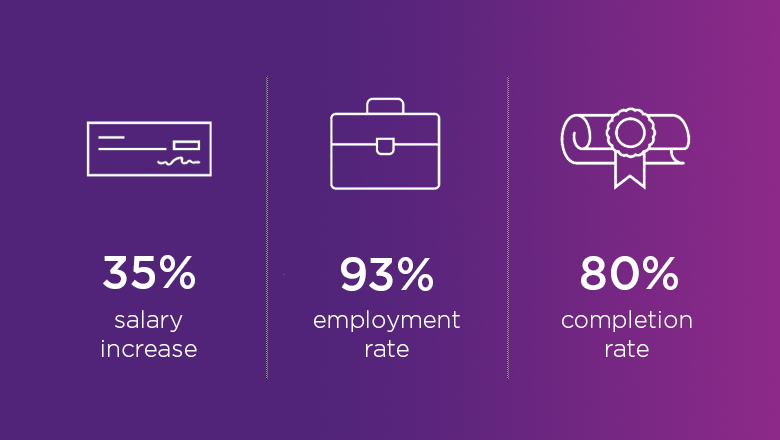Enrolling in postgraduate study is a big decision. It often involves reshuffling your routine, disrupting the norm and perhaps putting your current career on pause. When you’re making such a significant commitment, it makes sense to seek reassurance that you’re making a good choice. You want to know that doing a master’s is worth it.
After all, why do postgraduate study if you don’t know how it’s going to benefit you?
While we can’t make the decision for you, we can help you explore the potential rewards. The facts, figures and outcomes below can help you weigh up whether it’s worth doing a master’s degree in your near future.
Why is doing a master’s worth it? (Facts and figures)

Pay increases
Let’s start with salaries. Master’s degree graduates earn roughly 35% more* than bachelor’s degree graduates – $91,600 vs. $68,000 based on median salaries reported in the 2022 Graduate Outcomes Survey by Quality Indicators for Learning and Teaching (QILT).
Since a postgrad program is a financial investment, it’s good to know they tend to pay for themselves over time.
Here are some specific annual salary examples from Payscale.com^ to show how a postgraduate degree can increase your earning potential:
- High-school teachers with a Master of Teaching (Secondary) earn $77,500 on average. This is 21% more than high-school teachers with a Bachelor of Education (Secondary Education), who earn $64,100 on average.
- Software developers with a Master of Science earn $86,500 on average. This is 16% more than software developers with a Bachelor of Science, who earn $74,400 on average.
- Workers with a Master of Business Administration earn $105,000 on average. This is 40% more than workers with a Bachelor of Business Administration, who earn $75,000 on average.
*Keep in mind: this difference can fluctuate between disciplines and based on other factors such as age, location and your previous work experience.
^Data last updated from Payscale in January 2024. These numbers are based on self-reported salaries and include a wide range of sample sizes.
Promotions
Master's-level study isn’t necessarily a direct shortcut to a salary increase. More often, your extra degree will help you rise to a higher position that comes with a more generous salary.
The lucrative and more satisfying role you’d like may only be available to candidates with postgraduate qualifications. For example, according to Business Insider, some of the most high-paying jobs that require a master’s degree include:
- anaesthetist
- mathematician
- political scientist
- economist
- nurse practitioner
- physician assistant
- nurse midwife
- school administrator
- tertiary education administrator
- occupational therapist
- statistician.
Employment rates
These statistics about pay increases and promotions are nice and all. But getting a job in the first place might be your top priority and therefore the most significant reason why a master's degree is important.
QILT's 2022 Graduate Outcomes Survey provides insight into this, revealing that 93.3% of coursework postgraduates are employed (vs 88.3% of undergraduates), and that 89.4% of coursework postgraduates have full-time employment (compared to 78.5% of undergraduates).
Completion rates
When you invest in your education, you want to know that you’re going to get your money’s worth by seeing your degree through to completion. Data from the Department of Education, Skills and Employment indicates that postgraduate students in Australia are more likely to finish their degree than undergraduate students:
- 79.6% of postgraduate students had completed their degree or were still completing it.
- 75.9% of undergraduate students had completed their degree or were still completing it.
- 63.6% of postgraduates complete their degree within four years.
Why is doing a master’s worth it? (Personal outcomes)

Satisfaction
Not every reason to do a master’s degree can be measured or calculated.
The sense of accomplishment and fulfilment that comes with truly mastering your area of interest may not add another zero to your salary, but this could still be the most valuable benefit for you. Postgraduate study may be a key step towards discovering your ikigai (your life purpose). Or it may help you feel truly comfortable in your career (e.g. speaking with more confidence in the workplace or overcoming imposter syndrome).
Futureproofing
During uncertain times, extending your education can give you the adaptability and transferrable knowledge to pivot into new roles. What the post-pandemic world looks like is still very much unknown, but a master’s degree could help you prepare to own it.
You may also choose to study a master’s degree in a specific field or industry that is more stable than your current profession or is projected to grow in the future. Doing so can give you more career options and help you bounce back if your existing role ceases to exist.
“Investing in up-skilling in a growing field could help you gain job security, future-proof your career and increase your earning potential.”
New connections
The teachers aren’t the only important people you’ll meet and learn from during your master’s degree. Postgraduate study also provides the opportunity to stretch your professional network and make lifelong connections with likeminded peers.
Why is a master's important for you?
As you can see, there are plenty of strong reasons to do postgraduate study. But whether doing a master’s degree is worthwhile ultimately comes down to your needs and motivations – as well as how much you value them.
For example:
- If you’re feeling stuck in your career or missing key milestones such as promotions and pay rises, a postgraduate degree could be an essential stepping stone towards improving your career satisfaction.
- If excelling in your field and being a thought leader in your organisation is important to you, a master’s could give you a crucial step-up.
- If you’ve discovered a deeper passion in a different line of work, further study could be the ideal way to sidestep into a new industry without having to start from scratch.
Conversely, if you’re comfortable with your current role, trajectory, salary and knowledge level, the answer to the question 'should I do postgraduate study?' may be 'perhaps not at this stage in my career'.
Understanding your reasons and their importance is vital when enrolling in postgraduate study. Not only does this help you become one of those 79.6% of postgrads that complete their degree, but it also ensures you enter your studies with the right mindset to get the most out of your time back at uni.






